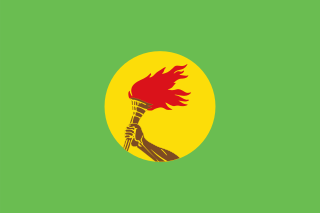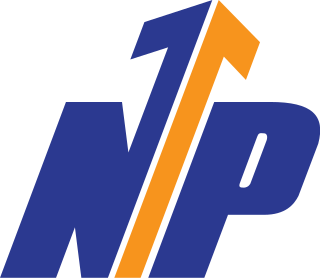Little is known of the history of Gabon before European contact. Bantu migrants settled the area beginning in the 14th century. Portuguese explorers and traders arrived in the area in the late 15th century. The coast subsequently became a centre of the transatlantic slave trade with European slave traders arriving to the region in the 16th century. In 1839 and 1841, France established a protectorate over the coast. In 1849, captives released from a captured slave ship founded Libreville. In 1862–1887, France expanded its control including the interior of the state, and took full sovereignty. In 1910 Gabon became part of French Equatorial Africa and in 1960, Gabon became independent.

A political party is an organization that coordinates candidates to compete in a particular country's elections. It is common for the members of a party to hold similar ideas about politics, and parties may promote specific ideological or policy goals.
The Republic of South Africa is a unitary parliamentary democratic republic. The President of South Africa serves both as head of state and as head of government. The President is elected by the National Assembly and must retain the confidence of the Assembly in order to remain in office. South Africans also elect provincial legislatures which govern each of the country's nine provinces.

Zaire, officially the Republic of Zaire, was the name of the Democratic Republic of the Congo from 1971 to 1997. Located in Central Africa, it was, by area, the third-largest country in Africa after Sudan and Algeria, and the 11th-largest country in the world from 1965 to 1997. With a population of over 23 million, Zaire was the most populous Francophone country in Africa. Zaire played a central role during the Cold War.
A one-party state, single-party state, one-party system or single-party system is a governance structure in which only a single political party controls the ruling system. All other parties are either outlawed or only enjoy limited and controlled participation in elections. Sometimes the term "de facto one-party state" is used to describe a dominant-party system that, unlike the one-party state, allows democratic multiparty elections, but the existing practices or balance of political power effectively prevent the opposition from winning power.

Mixed-member proportional representation is a type of representation provided by some mixed electoral systems which combine local winner-take-all elections with a compensatory tier with party lists, in a way that produces proportional representation overall. Like proportional representation, MMP is not a single system, but a principle and goal of several similar systems. Some systems designed to achieve proportionality are still called mixed-member proportional, even if they generally fall short of full proportionality. In this case, they provide semi-proportional representation.

The president of South Africa is the head of state and head of government of the Republic of South Africa. The president directs the executive branch of the government and is the commander-in-chief of the South African National Defence Force. Between 1961 and 1994, the office of head of state was the state presidency.

The Parliament of the Republic of South Africa is South Africa's legislature; under the present Constitution of South Africa, the bicameral Parliament comprises a National Assembly and a National Council of Provinces. The current twenty-eighth Parliament was first convened on 14 June 2024.

The National Party, also known as the Nationalist Party, were a political party in South Africa from 1914 to 1997, which was responsible for the implementation of apartheid rule. The party was an Afrikaner ethnic nationalist party, which initially promoted the interests of Afrikaners but later became a stalwart promoter and enactor of white supremacy, for which it is best known. It first became the governing party of the country in 1924. It merged with its rival, the SAP, during the Great Depression, and a splinter faction became the official opposition during World War II and returned to power. With the National Party governing South Africa from 4 June 1948 until 9 May 1994, the country for the bulk of this time was only a de jure or partial democracy, as from 1958 onwards non-white people were barred from voting. In 1990, it began to style itself as simply a South African civic nationalist party, and after the fall of apartheid in 1994, attempted to become a moderate conservative one. The party's reputation was damaged irreparably by perpetrating apartheid, and it rebranded itself as the New National Party in 1997 before eventually dissolving in 2005.

The United Party was a political party in South Africa. It was the country's ruling political party between 1934 and 1948.
Closed list describes the variant of party-list systems where voters can effectively vote for only political parties as a whole; thus they have no influence on the party-supplied order in which party candidates are elected. If voters had some influence, that would be called an open list. Closed list systems are still commonly used in party-list proportional representation, and most mixed electoral systems also use closed lists in their party list component. Many countries, however have changed their electoral systems to use open lists to incorporate personalised representation to their proportional systems.
The Democratic Party of Guinea – African Democratic Rally is a political party in Guinea that dominated Guinean politics under a one-party state system. The party was founded as a branch of the African Democratic Rally (RDA) in June 1947. On 19 October 1958 the party severed its links with the RDA, other members of which supported a closer union with France. The party's leader, Ahmed Sékou Touré, became the country's first president. Two years later, he declared the PDG to be the sole legal party in the country. As president of the PDG, Touré was the only candidate for president of the republic, and as such was elected unopposed to four seven-year terms. Every five years, a single list of PDG candidates was returned to the National Assembly. After the death of Touré and a coup staged by Lansana Conté in 1984, the PDG was dissolved.
This page is based on this
Wikipedia article Text is available under the
CC BY-SA 4.0 license; additional terms may apply.
Images, videos and audio are available under their respective licenses.






